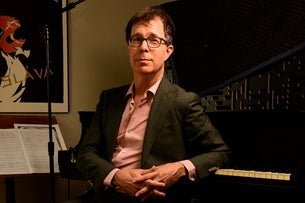Playing Piano Every Day Fucks Up Ben Folds' Hands But He Always Finds A Way To Laugh About It
'Gagging For It' is an excuse for Hannah Story to talk to famous people, under the guise of asking about what makes them laugh.

“I believe, to my, core that the saddest things are often best illuminated by humour, and I’ve always felt compelled to express emotion through a comic lens,” Ben Folds writes in his 2019 memoir, A Dream About Lightning Bugs.
“The type of laughter can indicate the height from which we fear we may fall, the depths to which we could so easily plummet, and the effort required to retain composure in our darkest times. And, of course, sometimes life is just funny.”
Speaking to 52-year-old Folds about what makes him laugh, it’s clear that a sense of humour is deeply intertwined with not only the music he makes – songs like 1997’s Song For The Dumped or his take on our very own murder capital and his former home, 2003’s Adelaide – but with the way he sees himself.
His sense of humour is “a big part of how [he] see things sometimes”. “I probably have a comedian's sense of humour, in that I see it as part of life,” he begins.
“I just think life is funny. It sometimes just seems so absurd, like your brain in a jar making it up, and I'm really entertained by those things.”
He’s not so much interested in traditional set-up, punchline humour. Instead, he pinpoints irony and absurdity as the source of much of what makes him laugh.
Don't miss a beat with our FREE daily newsletter
“I've kind of just always seen things and thought they were funny. I don't think stuff like people falling down and farting noises and stuff like that are particularly funny.
“I just think life is funny,” Folds muses. “It sometimes just seems so absurd, like your brain in a jar making it up, and I'm really entertained by those things.
“Today I'm pretty sleep-deprived and I've had to rehearse the new band most of the day, and doing press between VIP things, a masterclass, whatever. I don't think I would laugh a lot now simply because that would expend energy, if that makes any sense [laughs]. And there I go, that made me laugh...”
A specific example of the kind of absurdity that interests Folds is the characters in sketch comedy Little Britain, Lou and Andy, played by David Walliams and Matt Lucas. He underlines that “there’s a lot of humanity” in their skits.
“I thought Little Britain was very funny, because it was the same skit over and over again. And it couldn't have been based on the punchline because everyone knew what the punchline was gonna be. And it was just the absurdity of the situation which made me laugh.”
He recalls laughing at a line on a Pink Floyd cassette when he was in high school – the moment where he says a voice yells: “Eugene, where are you going with that axe?”
“I remember laughing so hard I couldn't breathe. I don't know why I thought that was funny. The guy's voice was funny.”
Folds’ memoir makes it clear how intrinsic music has always been to the way he moves through the world, starting with playing records obsessively – eight hours a day, his mum said – since he was just two.
And the way he looks at music is also wound up in a sense of humour. He says two to three times a day while he’s on tour, he’ll laugh about a new song called Moscow Mitch. “We say, 'Moscow Mitch,' and it seems so silly,” Folds says.
Back at the beginning of this month, Folds first performed the largely instrumental song in New York City. To the tune of The Knack’s My Sharona, he encouraged the crowd to sing with him, “Mo-mo-mo-mo-Moscow Mitch,” a reference to the Republican Senate Majority Leader Mitch McConnell. The politician has been accused by conservative media of being associated with Russia, because of his efforts to kill two election security bills.
“That [song] makes me laugh because the whole premise of him being at all tied to Moscow is so absurd. But that's what people are into. And aside from that, [the nickname] seems to make [McConnell] unhappy, and he's the kind of guy who's done a few things that have probably hurt a lot of people.”
It’s important for Folds to approach songwriting from a place of humour, because he’s trying to capture something true about life. Life is funny and sad and everything in between.
“I mean, there's always something in a song that I see as slightly funny. I think that has branded many of my songs as novelty songs, because humour is verboten in pop music for the most part, unless you are writing a novelty song, a goofy song. I don't see it that way.”
He expands upon the point he made in his memoir – that humour is way to retain composure in the middle of something tough.
“You see an old man, and it's like if something really bad happens, he might crack a joke about it as a survival technique. And if you use humour in those ways, it's a more serious thing. You can have a laugh but there's something underneath it.”
But Folds isn’t convinced that it’s necessary to try to balance the darkness with humour in songs. Instead, he stresses that it’s about serving the story he’s trying to tell.
“The song Brick [1997], which was a pretty big hit for my band [Ben Folds Five], was about a teenage abortion. Really I don't see anything funny about any of that at all, and I don't see how the characters in that escape anything by added humour. To me, [humour] doesn't illuminate anything, so there's no need to balance something like that.”
But there are other songs that have more of a humorous edge to them. He points to 2001’s The Luckiest, a song he notes is popular at weddings.
“It’s odd to have a verse about an old man dying and then the wife dies a week later in a love song. But it is a very romantic song. That's unusual. And, obviously, it was funny, but it's a little out of place. It's not that I think that's funny, it's just much humour, as with stating a fact of any kind, can be seen as inappropriate.
“The second verse of [The Luckiest] ponders, what if I was 55 years old and my soulmate came by on her bike and she was eight? And that's a little weird too.”
There are few things that he deems off limits as a source of humour, partly because of an impulse to laugh when he’s not supposed to. He thinks there’s something about his age, his generation, that baulks at the extreme caution, or seriousness, of some politically correct language.
“I think everyone should be dignified and protected,” Folds attests. “But now that [being PC has] become such serious business, I also come into this mind where I think, 'Well, you're not supposed to laugh at that? Well, this is now getting very interesting and very funny.'
“I find myself thinking things are funny that I didn't think were funny before because people are taking themselves very seriously sometimes when I think we should relax. So it makes me laugh at stuff that I don't even want to repeat. It's actually not funny, it's because, when you tell someone not to laugh, sometimes they laugh – you tense up and the reflex kicks in.
“A lot of the stuff that's in the air right now, where we're trying to improve society, results in things that are forbidden, absolutely verboten to say [or] think… There are reasons for that, I totally get it, but it makes me laugh.”
Laughing at something awful, Folds says, can strip that thing of its power.
“The whole thing about laughing at someone else's expense is that you can both laugh at it, and everyone can dignify the other as an equal human being. Then I think suddenly it's undetonated, it doesn't carry weight anymore. That's the irony of trying to protect each other, you know.
“Part of the reason we want to laugh in the first place is as an equaliser – it's a way of saying, 'I understand you, I agree.'”
“I always, always make a joke if I'm in a tight spot or something terrible's happened."
Humour is really just a part of Folds day-to-day life. He talks about the pain in his hands from playing piano every day while on tour: “There's blood caked under all of the fingernails and they're all bruised on the ends, and there's not much cartilage left in my thumb,” he explains.
“The last few mornings I haven't been able to use my fingers to get in my pockets, pick up a key, zip up a bag, because that happens on tour sometimes, and it's irritating. But, you know, I make jokes about it and that makes it easier.
“I always, always make a joke if I'm in a tight spot or something terrible's happened. I would begin to worry about myself if that just didn't exist anymore.”
Asked to think of something recently that made him laugh, he talks about his daily tour ritual of trying to steal a Sharpie from the woman who organises VIP guests – “the lady that lines people up to get pictures”.
“I always try to steal her Sharpie from her. She usually catches me. She didn't catch me today, so I thought that was funny.”
Ben Folds tours A Dream About Lightning Bugs from 24 Aug.
Related Gigs











